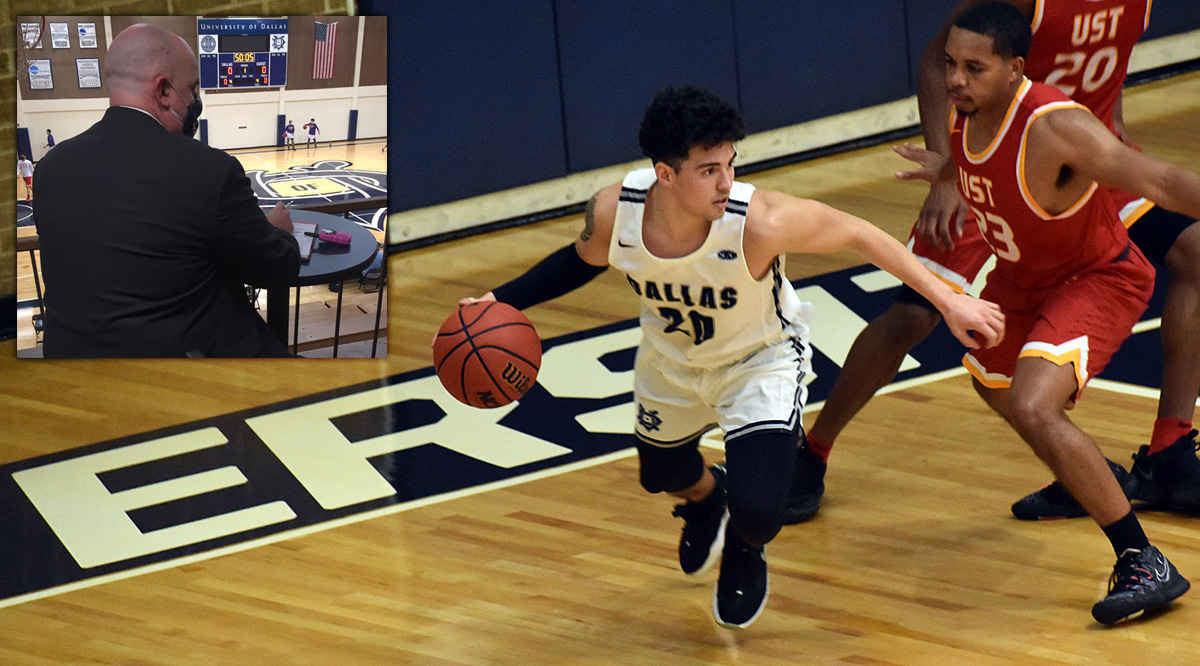
|
| This is about the view Matt Grahn gets when the University of Dallas is at home. University of Dallas athletics photos |
By Ryan Scott
D3hoops.com
Yes, that man screaming from the balcony at the University of Dallas’ Maher Center during men’s basketball games is, in fact, in his right mind. He’s supposed to be there – doctor’s orders – just one of many odd COVID adjustments being made around the country to get games in during a pandemic.
“We’ve always tried to stress with our guys that it’s not just about basketball,” says UDallas head coach, Jared Samples. “We want them to be better men, better husbands, better dads; and there’s no better example than what Matt’s doing right now. For our guys to see this first-hand is really important.”
“I didn’t want to do it, at first,” says Matt Grahn, the screaming man in question, and Sample’s assistant coach, who also serves as recruiting coordinator for the athletic department. “I felt like I was abandoning the guys, but we break our huddles with ‘family’ and this is a great opportunity to model what family means.”

|
| Socially distant and then some, Matt Grahn coaches from the balcony for the University of Dallas. University of Dallas athletics photo |
Grahn coaches, both in home games and during practice, from the upper reaches of the gym, because his wife is expecting their third child any day now. “As we’ve learned more about the dangers of COVID to pregnant women,” says Grahn, “and with the extra risk factors that already exist for this pregnancy, I just realized I had to get off the floor with these guys.”
Grahn’s not the only one changing things up for the sake of safety. Coaches and spouses have continued to have children in the midst of pandemic, which adds an extra layer of risk to an already difficult situation.
“Take every precaution,” says Aurora men’s coach, Matt Airy, whose family dealt with a newborn and COVID almost ten months ago. “Having a newborn is already a stressful mix of joy and trauma; it’s not advisable to inject more trauma. It’s too special, too important.”
Airy developed fatigue and a loss of taste and smell shortly after a recruiting trip to California in late February and early March, right as his wife was preparing to give birth to their first child. “My symptoms finished up right as we went into the hospital,” says Airy, “Now, of course, they’d never let me into the building, but, at the time, all they were asking about was shortness of breath and fever, neither of which I had.”
So early in the process of understanding COVID there were a lot of unknowns, especially for rookie father, Airy, who found himself home alone with a newborn after his wife tested positive as she readied for release.
“I don’t think there’s a single guy on the team who hasn’t known someone who’s gotten sick. They want to play, because it’s a tremendous outlet for our student-athletes, but they also want to be safe.”- Aurora head men's basketball coach Matt Airy |
“It might seem to some and in some places,” says Airy, “with the vaccine coming out and how far we’ve come like this is not a big deal, but I can tell you, being home along with a newborn and worrying about your spouse in the hospital because of a virus is a terrifying experience.”
Young Malcolm Airy, mom, and dad are all doing fine now and Aurora is preparing to play basketball with a profound understanding of exactly what they’re facing. “Maybe they’re cautious because of our experience,” says Airy, “but I don’t think there’s a single guy on the team who hasn’t known someone who’s gotten sick. They want to play, because it’s a tremendous outlet for our student-athletes, but they also want to be safe.”
Aurora shut down fall practice a few weeks early, in part because the players recognized an increasingly risky situation, with numbers climbing. Student athletes across the country have shown tremendous maturity and resiliency in dealing with the COVID fallout – from the 32 teams who didn’t get to finish their basketball seasons in 2020, to those thousands who’ve had this year radically altered, they have a perspective beyond what we’re prone to expect from young, competitive athletes.
The UDallas players are certainly taking the changes to their routine in stride. After some initial hiccups, the team has worked out a system to keep Grahn involved and safe. “At first I was blowing Jared’s phone up with texts,” says Grahn. “He couldn’t keep them all straight. Now I just take notes and call during halftime.”
“I also have a pretty booming voice. They can hear me when I have something to say.”- University of Dallas assistant coach Matt Grahn |
For practice, Grahn’s commandeered his older children’s walkie-talkies to have one-on-one conversations when needed. “I also have a pretty booming voice,” he adds. “They can hear me when I have something to say.” Grahn’s oldest child, in fact, was the inspiration for all of this in the first place.
“Nine years ago,” he says, “We had a weekend trip to Atlanta a day or two before my wife’s due date. She told me if I went [and missed the birth] I would not be alive very long when I got back.” Grahn coached those games via webstream, so there was proof of concept for this experiment.
The athletic department has been fully behind the plan from Day 1, “It was a matter of figuring out how Matt could be most efficient and effective,” says Samples, “but there was no chance we weren’t going to make it work.”
